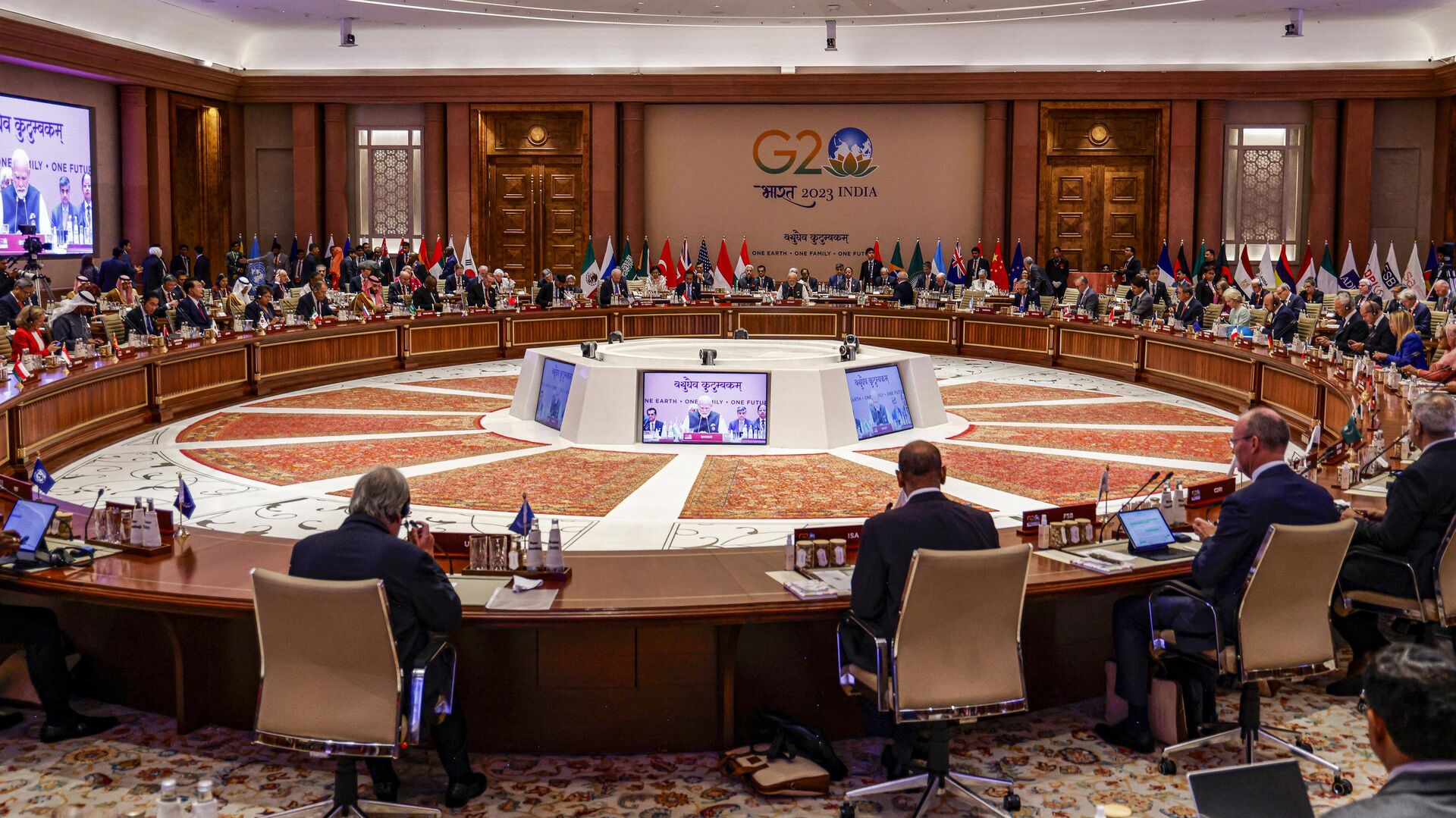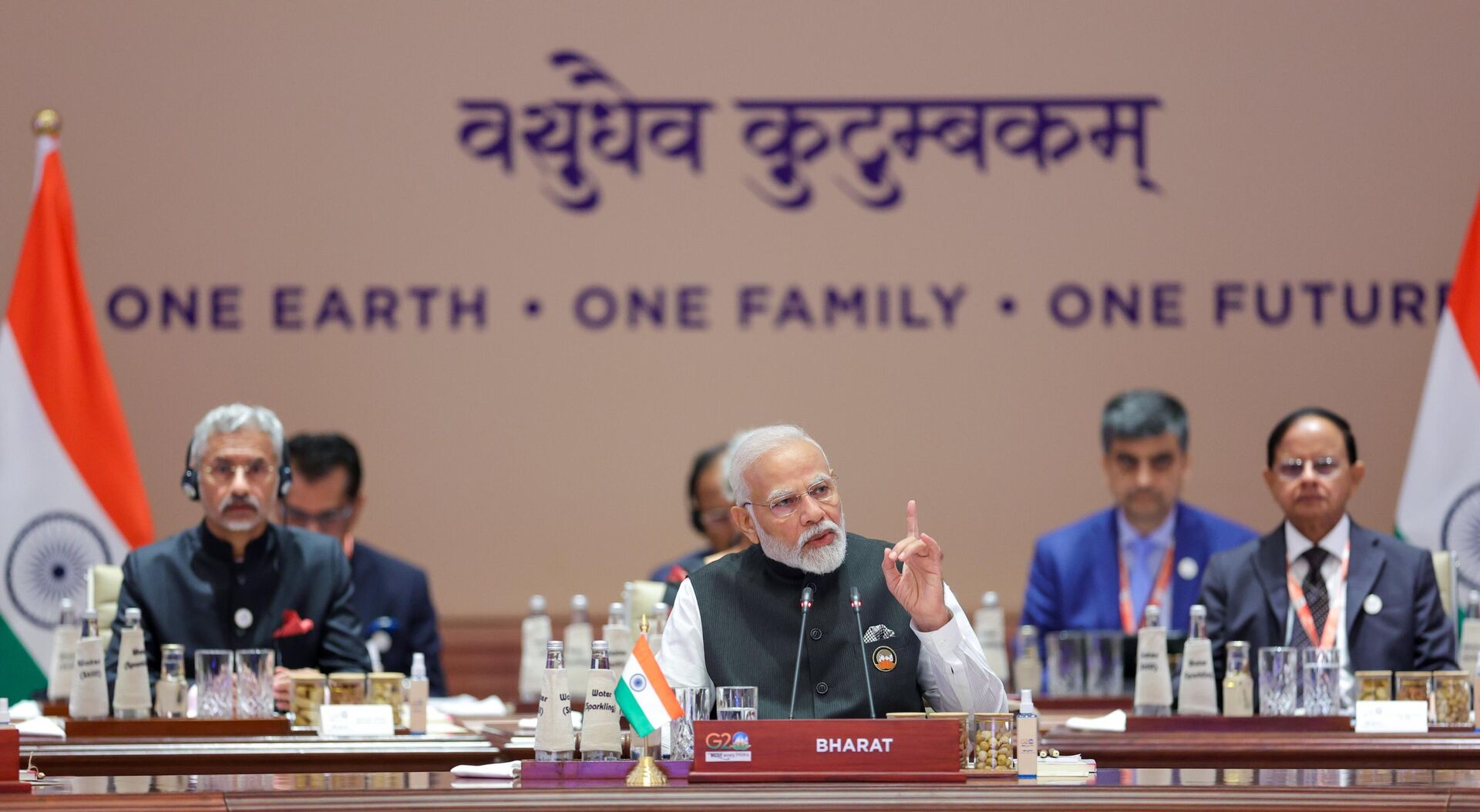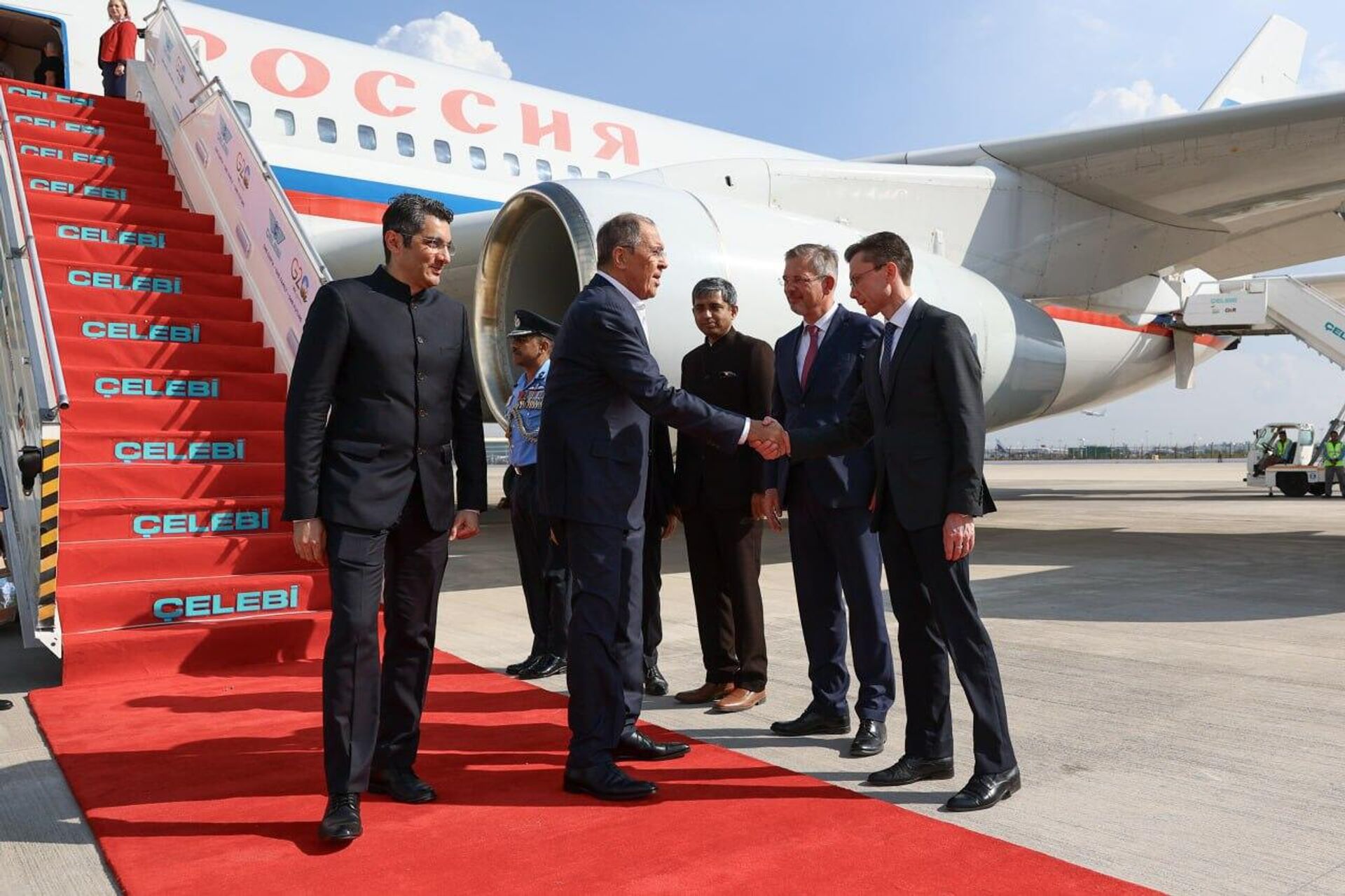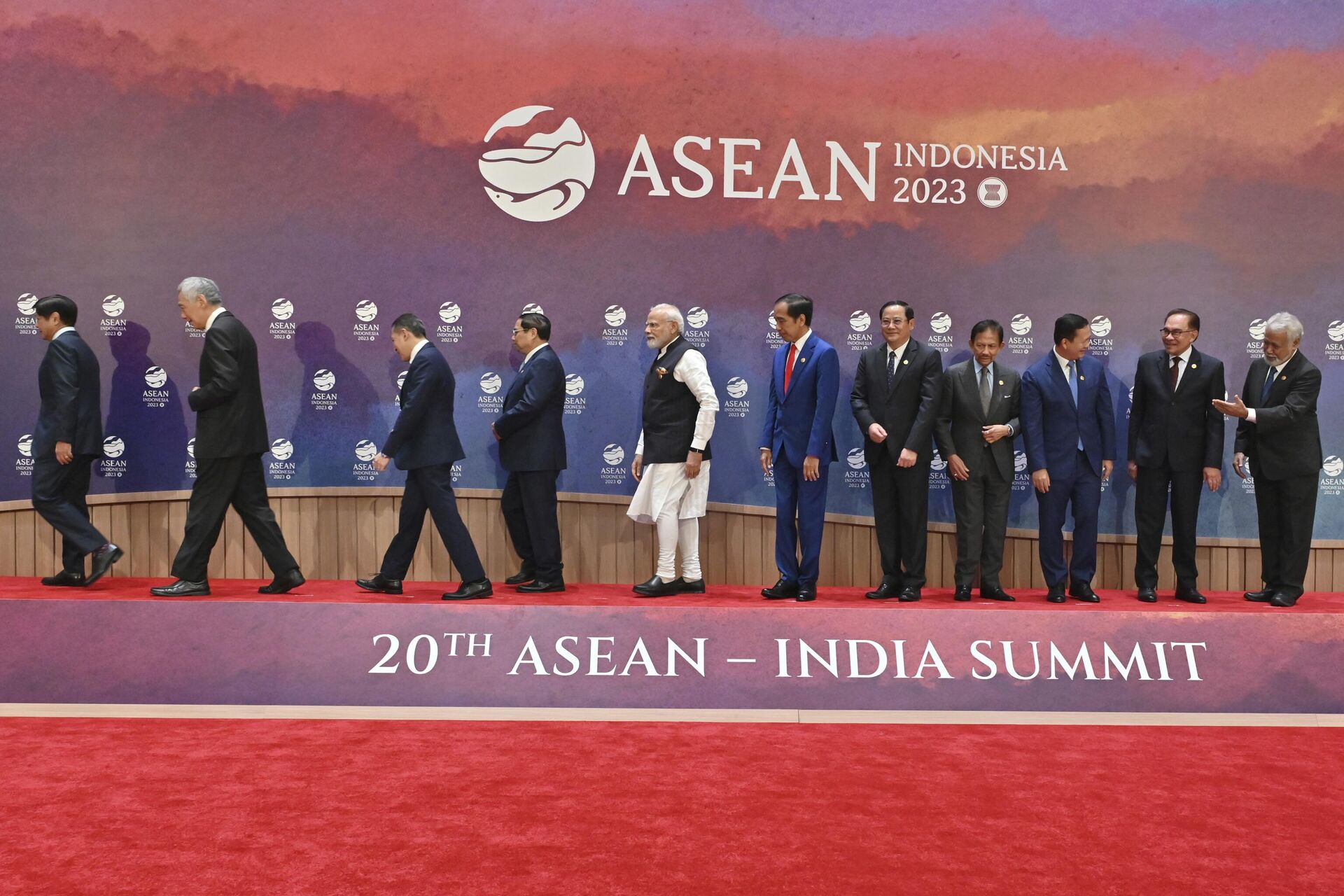https://sputniknews.in/20230910/g-20-summit-in-india-stays-focused-disallows-irritants-4160095.html
G-20 Summit in India Stays Focused, Disallows Irritants
G-20 Summit in India Stays Focused, Disallows Irritants
Sputnik India
From the start, the New Delhi conclave exuded a no-nonsensical air and meant business.
2023-09-10T12:30+0530
2023-09-10T12:30+0530
2023-09-10T12:30+0530
g-20 summit in new delhi
g-20
india
ukraine
china
s. jaishankar
xi jinping
volodymyr zelensky
un security council (unsc)
sergey lavrov
https://cdn1.img.sputniknews.in/img/07e7/09/0a/4161097_187:0:3828:2048_1920x0_80_0_0_5aad48737116a9b61f837134fdbe247c.jpg
Several days before the G-20 “Leaders’ Declaration” was adopted at the G-20 summit in Delhi on September 9, G-20 Sherpa Amitabh Kant had told me on the phone: “This is primarily an economic forum and not exactly a platform for conflict resolution.” He also said that a leaders’ declaration would be announced during the conclave, notwithstanding the differences of opinion among the members.The effort to build a consensus at this crucial moment in the history of the G-20, which was formed in 1999 after the Asia Financial Crisis and has been meeting annually since the global economic meltdown of 2008, had started months before the meet through messages that India conveyed to the members. Of course, geopolitics, geostrategy and geoeconomics are all inter-linked, but this is predominantly a body for discussing economic and financial matters. “India has been clear, since the beginning of the year, as to who the special invited guests should be, including nine countries (Spain, Netherlands, the UAE, Oman, Egypt, Mauritius, Nigeria, and Bangladesh),” Dhruva Jaishankar, executive director of the Observer Research Foundation America, told me in an interview amidst speculations over a likely invite to Ukrainian President Volodymyr Zelenskyy to the G-20 summit.Later, when news reports began to appear that India had snubbed Zelensky, New Delhi’s response was that it saw the intergovernmental body as an economic forum. But Jaishankar, who is the son of Indian Foreign Minister S. Jaishankar, also spoke to me about the balancing act: “Ukraine has been mentioned at every major G-20 statement so far under India’s presidency, despite opposition from Russia and China.” This time, the subject was mentioned with the signature message of Indian Prime Minister Narendra Modi: “Today’s era must not be of war.” Unlike the previous Bali meet, however, India didn’t want Zelensky to make a speech either virtually or in person.For his part, Kant, a top-notch former Indian bureaucrat from the Kerala cadre, had begun the process of finding convergence of opinions among member-countries, especially in his meetings with G-20 Sherpas from elsewhere that started on September 3 at the ITC Grand Bharat in Manesar, Haryana, on the outskirts of Delhi.Clearly, the declaration reflected the rigour of the discussions and the dexterity with which career diplomats and others, guided by the Indian leadership, drafted the final version. India had stressed all along on the “the spirit of collaboration, cooperation, and shared responsibility”. Kant posted on X (formerly Twitter), “With 112 outcomes and presidency documents, we have more than tripled the substantive work from previous presidencies.” He also disclosed that to thrash out a consensus on "geopolitical paragraphs" in the Declaration, it took his team "over 200 hours of non-stop negotiations, 300 bilateral meetings, and 15 drafts".India did include a mention of the situation in Ukraine, but without making any judgements that the West is typically known for. “Concerning the war in Ukraine, while recalling the discussion in Bali, we reiterated our national positions and resolutions adopted at the UN Security Council and the UN General Assembly (A/RES/ES-11/1 and A/RES/ES-11/6) and underscored that all states must act in a manner consistent with the Purposes and Principles of the UN Charter in its entirety. In line with the UN Charter, all states must refrain from the threat or use of force to seek territorial acquisition against the territorial integrity and sovereignty or political independence of any state. The use or threat of use of nuclear weapons is inadmissible,” the declaration said.Indian officials had publicly and in formal conversations continued to emphasise prior to the summit and later that voicing the concerns of the Global South has always been at the core of India’s G-20 agenda. The thrust of making it an inclusive gathering was at the core of the Indian presidency. The inclusion of the 55-member African Union as the first new member of the G-20 is a testament to such a spirit of solidarity with countries that need their voices to be heard. It will have the same status as the 27-member European Union, which is the only regional body that is a permanent member till date in G-20.To this end, the declaration reaffirmed the member-states’ commitment to achieving the Brisbane Goal of reducing the gap in labour force participation and implementing the G-20 roadmap towards and beyond the Brisbane Goal ‘25 by 25’ (commitment to reduce the gender gap in labour market participation by 25% in 2025). It asked the ILO (the International Labour Organisation) and OECD (the Organisation for Economic Co-operation and Development) to report progress annually. Kant said later that “there is a huge focus (in the Declaration) on gender-inclusive climate action.”Although a section of the media had lapped up Chinese leader Xi Jinping’s absence as a sign of trouble and that a Declaration may not be easy to achieve, that was not to be. Xi had in his place sent premier Li Qiang to New Delhi.As regards the logic of Xi staying back in China, Richard McGregor, an award-winning journalist and author of the bestsellers, The Party: The Secret World of China’s Communist Rulers and Xi Jinping: The Backlash, told me in an interview, “Xi’s absence makes perfect geopolitical sense in one respect. China is in the business of building up BRICS, where it has more friends and influence, and less interest in the G-20, which features more of its rivals.”Meanwhile, there is talk within India that the ruling party is making use of the pomp and show around the summit for its own propaganda ahead of the upcoming polls.Whatever the domestic politics of it, the remarkable aspect of the G-20 meeting that concludes on September 10 is that the officials, including those in the Indian Ministry of External Affairs and elsewhere, were confident of a positive outcome from the start – and they pulled it off, while keeping the word that the G-20 meet cannot be allowed to be a place to settle geopolitical scores.Ullekh NP is a writer, journalist, and political commentator based in New Delhi. He is the executive editor of the newsweekly Open and author of three nonfiction books: War Room: The People, Tactics and Technology Behind Narendra Modi’s 2014 Win; The Untold Vajpayee: Politician and Paradox; and Kannur: Inside India’s Bloodiest Revenge Politics.
india
ukraine
china
russia
new delhi
Sputnik India
feedback.hindi@sputniknews.com
+74956456601
MIA „Rossiya Segodnya“
2023
News
en_IN
Sputnik India
feedback.hindi@sputniknews.com
+74956456601
MIA „Rossiya Segodnya“
Sputnik India
feedback.hindi@sputniknews.com
+74956456601
MIA „Rossiya Segodnya“
g-20 summit in india stays focused, g-20 summit in india disallows irritants, g 20, g-20, g 20 summit, g20, g20 summit, g-20 summit india, g-20 summit new delhi, 2023 g20 summit, 2023 g20 new delhi summit, 2023 g-20 summit in new delhi, g20 summit 2023, g20 summit 2023 news, who will host g20 summit in 2023, g20 summit 2023 start date, g20 summit 2023 date, g20 summit 2023 theme, what is g20 summit 2023, g20 countries, g20 ukraine, g20 zelenskyy, g20 global south agenda, india g20 presidency, g20 xi jinping, ladakh standoff, g20 news, china in g20, china and g-20, xi in g-20 summit, india stance on ukraine, ukraine in g20, g20 leaders' summit, he russian foreign ministry, conflict in ukraine, g20 leaders’ summit,
g-20 summit in india stays focused, g-20 summit in india disallows irritants, g 20, g-20, g 20 summit, g20, g20 summit, g-20 summit india, g-20 summit new delhi, 2023 g20 summit, 2023 g20 new delhi summit, 2023 g-20 summit in new delhi, g20 summit 2023, g20 summit 2023 news, who will host g20 summit in 2023, g20 summit 2023 start date, g20 summit 2023 date, g20 summit 2023 theme, what is g20 summit 2023, g20 countries, g20 ukraine, g20 zelenskyy, g20 global south agenda, india g20 presidency, g20 xi jinping, ladakh standoff, g20 news, china in g20, china and g-20, xi in g-20 summit, india stance on ukraine, ukraine in g20, g20 leaders' summit, he russian foreign ministry, conflict in ukraine, g20 leaders’ summit,
Several days before the G-20 “
Leaders’ Declaration” was adopted at the G-20 summit in Delhi on September 9, G-20 Sherpa Amitabh Kant had told me on the phone: “This is primarily an economic forum and not exactly a platform for conflict resolution.” He also said that a leaders’ declaration would be announced during the conclave, notwithstanding the differences of opinion among the members.
The effort to build a consensus at this crucial moment in the history of the G-20, which was formed in 1999 after the Asia Financial Crisis and has been meeting annually since the global economic meltdown of 2008, had started months before the meet through messages that India conveyed to the members. Of course, geopolitics, geostrategy and geoeconomics are all inter-linked, but this is predominantly a body for discussing economic and financial matters. “India has been clear, since the beginning of the year, as to who the special invited guests should be, including nine countries (Spain, Netherlands, the UAE, Oman, Egypt, Mauritius, Nigeria, and Bangladesh),” Dhruva Jaishankar, executive director of the Observer Research Foundation America, told me in an
interview amidst speculations over a likely invite to Ukrainian President Volodymyr Zelenskyy to the G-20 summit.
Later, when news reports began to appear that India had snubbed Zelensky, New Delhi’s response was that it saw the intergovernmental body as an economic forum. But Jaishankar, who is the son of
Indian Foreign Minister S. Jaishankar, also spoke to me about the balancing act: “Ukraine has been mentioned at every major G-20 statement so far under India’s presidency, despite opposition from Russia and China.” This time, the subject was mentioned with the signature message of Indian Prime Minister Narendra Modi: “Today’s era must not be of war.” Unlike the previous Bali meet, however, India didn’t want Zelensky to make a speech either virtually or in person.
India also took great care to accommodate the views of both the G-7-led West as well as those of Russia, a friend, by repeatedly insisting that economics gets top priority at the forum.
For his part, Kant, a top-notch former Indian bureaucrat from the Kerala cadre, had begun the process of finding convergence of opinions among member-countries, especially in his meetings with G-20 Sherpas from elsewhere that started on September 3 at the ITC Grand Bharat in Manesar, Haryana, on the outskirts of Delhi.
Clearly, the declaration reflected the rigour of the discussions and the dexterity with which career diplomats and others, guided by the Indian leadership, drafted the final version. India had stressed all along on the “the spirit of collaboration, cooperation, and shared responsibility”. Kant posted on X (formerly Twitter), “With 112 outcomes and presidency documents, we have more than tripled the substantive work from previous presidencies.” He also disclosed that to thrash out a consensus on "geopolitical paragraphs" in
the Declaration, it took his team "over 200 hours of non-stop negotiations, 300 bilateral meetings, and 15 drafts".
India did include a mention of the situation in Ukraine, but without making any judgements that the West is typically known for. “Concerning the war in Ukraine, while recalling the discussion in Bali, we reiterated our national positions and resolutions adopted at the
UN Security Council and the UN General Assembly (A/RES/ES-11/1 and A/RES/ES-11/6) and underscored that all states must act in a manner consistent with the Purposes and Principles of the UN Charter in its entirety. In line with the UN Charter, all states must refrain from the threat or use of force to seek territorial acquisition against the territorial integrity and sovereignty or political independence of any state. The use or threat of use of nuclear weapons is inadmissible,” the declaration said.
Reflective of the Indian position, there was however a caveat, “Reaffirming that the G-20 is the premier forum for international economic cooperation, and recognizing that while the G-20 is not the platform to resolve geopolitical and security issues, we acknowledge that these issues can have significant consequences for the global economy.”
Indian officials had publicly and in formal conversations continued to emphasise prior to the summit and later that voicing the concerns of the Global South has always been at the core of India’s
G-20 agenda. The thrust of making it an inclusive gathering was at the core of the Indian presidency. The inclusion of the 55-member African Union as the first new member of the G-20 is a testament to such a spirit of solidarity with countries that need their voices to be heard. It will have the same status as the 27-member European Union, which is the only regional body that is a permanent member till date in G-20.
Meanwhile, the declaration also stressed on gender unity, and said, “We encourage women-led development and remain committed to enhancing women’s full, equal, effective, and meaningful participation as decision makers for addressing global challenges inclusively and in contributing as active participants in all spheres of society, across all sectors and at all levels of the economy, which is not only crucial for achieving gender equality, but also for contributing to global GDP growth.”
To this end, the declaration reaffirmed the member-states’ commitment to achieving the Brisbane Goal of reducing the gap in labour force participation and implementing the G-20 roadmap towards and beyond the
Brisbane Goal ‘25 by 25’ (commitment to reduce the gender gap in labour market participation by 25% in 2025). It asked the
ILO (the International Labour Organisation) and OECD (the Organisation for Economic Co-operation and Development) to report progress annually. Kant said later that “there is a huge focus (in the Declaration) on gender-inclusive climate action.”
Although a section of the media had lapped up Chinese leader Xi Jinping’s absence as a sign of trouble and that a Declaration may not be easy to achieve, that was not to be. Xi had in his place sent premier Li Qiang to New Delhi.
As regards the logic of Xi staying back in China, Richard McGregor, an award-winning journalist and author of the bestsellers
, The Party: The Secret World of China’s Communist Rulers and
Xi Jinping: The Backlash, told me in an
interview, “Xi’s absence makes perfect geopolitical sense in one respect. China is in the business of building up
BRICS, where it has more friends and influence, and less interest in the G-20, which features more of its rivals.”
Meanwhile, there is talk within India that the ruling party is making use of the pomp and show around the summit for its own propaganda ahead of the upcoming polls.
Whatever the domestic politics of it, the remarkable aspect of the G-20 meeting that concludes on September 10 is that the officials, including those in
the Indian Ministry of External Affairs and elsewhere, were confident of a positive outcome from the start – and they pulled it off, while keeping the word that the G-20 meet cannot be allowed to be a place to settle geopolitical scores.
Ullekh NP is a writer, journalist, and political commentator based in New Delhi. He is the executive editor of the newsweekly Open and author of three nonfiction books: War Room: The People, Tactics and Technology Behind Narendra Modi’s 2014 Win; The Untold Vajpayee: Politician and Paradox; and Kannur: Inside India’s Bloodiest Revenge Politics.





